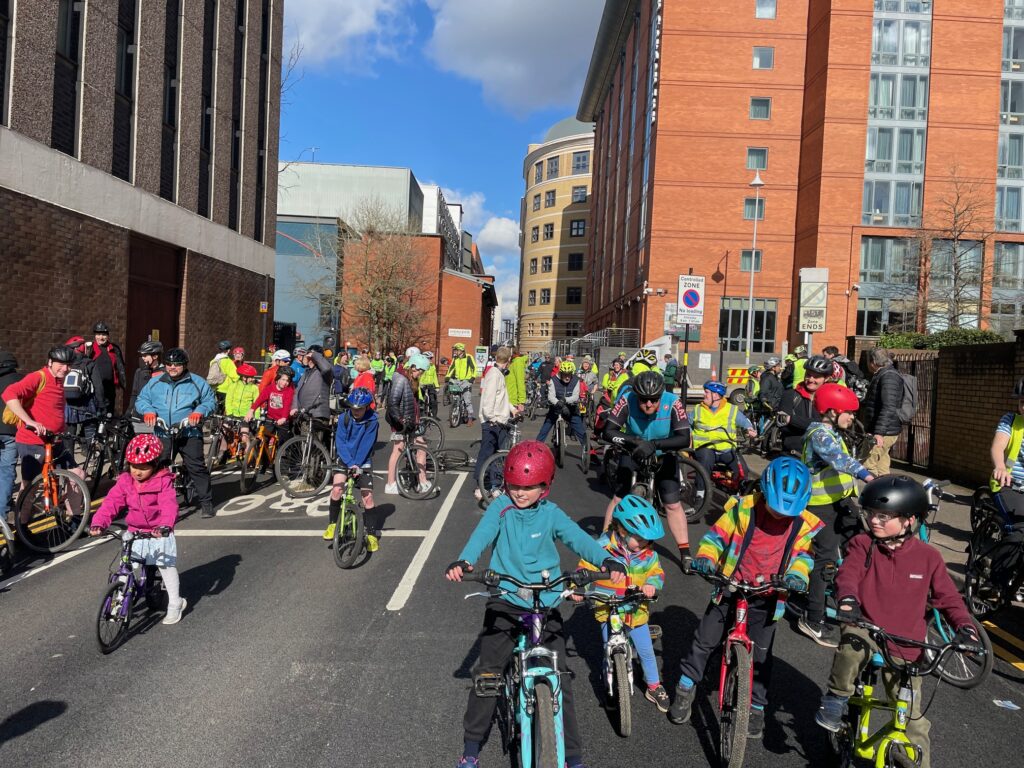
At the end of a 380km three-day bike ride from Newcastle to Birmingham, Dr Heather Lambert still had enough puff to conduct a series of interviews with journalists.
Media duties completed, she then joined hundreds of cyclists in Ride For Their Lives — an annual event that sees healthcare professionals campaign for cleaner air by taking part in a mass cycle ride.
For any other pensioner, this punishing schedule might be regarded as pushing it, but if you’re a two-time duathlon sprint champion in the 65-69 age range, maybe it’s all in a day’s work.
Heather has always been a keen athlete — first as a runner, then a cyclist — and the joy of a healthy life and the benefits of physical activity are something she’s passionate about future generations enjoying too, which is one of the reasons why she’s so keen to publicise Ride For Their Lives and the cause it champions.
- Read more: Leamside will create great opportunities
- Read more: Communities banking on new hubs
She appeared in newspapers across the country during the run-up to the event, co-wrote an open letter to The Guardian and was filmed on the day by BBC and ITV — not something that comes naturally to her but something she handles like a natural, as she explains how air pollution is estimated to cause 28,000-36,000 premature deaths a year; seven million globally.
“The Ride is about sharing this kind of information and thinking about how we encourage people to transition away from fossil fuels as the main causes of air pollution,” she said.
“We in healthcare can work with our hospitals and organisations like our Royal Colleges. We can go back and talk to our councils to get local action.”
Asked at the very end of our own interview whether there was one, single message she was keen to get across to readers, she mentioned the campaign strapline: “Every child has the right to breathe clean air.”
It’s a simple message but one she pointed out has always been taken for granted until now.
And because air is all around us but invisible, the harm that dirty air does can easily go unnoticed by the general public.
Not by health professionals though, as it turns out.

Heather was a paediatrician at Newcastle’s Great North Children’s Hospital for 30 years, having joined in 1992, and during that time she saw increasing health issues in children associated with air pollution.
“There’s now very detailed scientific evidence that air pollution increases conditions like dementia, asthma, lung disease and chest diseases,” she says.
“Children are affected most of all because they breathe faster than adults and their bodies are still developing.
“We talk a lot about diet and exercise but breathing isn’t a choice — we wouldn’t give a child a cup of dirty water to drink but we’re happy to keep our cars idling outside school gates.
“So, not only is it important to speak up for young people who don’t have a voice but we want to encourage the public and the authorities to look at ways they might cut down on pollution.
“The increase in the risks and dangers are linked to the climate crisis making things worse, and to protect the public we need to cut back on all fossil fuels, from coal oil and gas — even wood stoves — and we should encourage walking and cycling wherever possible.”
People often think small changes they make can’t make a difference but the more people do them, the more those small changes make a difference
Dr Heather Lambert
While the good doctor is passionate about these issues, she accepts not everyone is on the same page.
The issue of clean-air zones in cities has proven controversial in recent times and easy to weaponise politically, dividing public opinion, but that’s something the Ride For Their Lives organisers are keen to avoid.
“I’m a big fan of nudging,” Heather mused. “If you pit one side against the other it doesn’t end well but you can nudge people in the right direction, and then you get somewhere.
“After all, what’s wrong with taking that walk or bike ride, instead of the car? What small things can you do to reduce pollution?
“People often think small changes they make can’t make a difference but the more people do them, the more those small changes make a difference.”
Ewan Hamnett, organiser of the Birmingham Ride For Their Lives event, said: “This isn’t an anti-car protest — it’s pro-people. It’s about what we want our cities to look like.
“We all want safe, green and clean cities, and to live in places where children can thrive.
“Ride For Their Lives is about giving children the basic human right of being able to be physically active and to breathe clean air.”
The original event sprang out of a desire from healthcare professionals based in London during the COP26 gathering in 2021 to draw attention to pollution levels in urban areas causing harm to children.
Their cycle ride from the capital to Glasgow was intended as a one-off stunt but it was so successful that it is now held every year.

Last year it was held in Glasgow and Heather chose to cycle there — a decision that inspired others in the healthcare profession to follow her example, with riders cycling from Nottingham, Leeds, Bristol and London.
“We formed a group called Spokes in the Hub because we were coming from all directions and Birmingham was the hub,” Heather explains with a smile.
No one travelled further than our retired paediatrician, though. Heather linked up with fellow doctors in Leeds and two more in Derby, having set off midweek from Newcastle with cycling companion Karen Neilson alongside her. Karen, a recently retired GP, is, like Heather, showing no signs of slowing down either.
They linked up with hundreds of other riders on Sunday afternoon to cycle around a Birmingham city centre route, briefly closed to traffic, ahead of the health workers among the riders who were heading off to the Royal College of Paediatrics and Child Health’s annual conference being held in the city.
“It’s a great event to be part of and not only does the Ride make sure this issue stays in the public eye but it also highlights how beneficial some of these lifestyle changes can be,” said Heather.
“Sometimes it’s hard to imagine what change looks like unless you can see it and Ride For Their Lives shows a city centre with bike riders travelling along together.
“It’s a lovely feeling, when you’re cycling along you’re much more in touch with your environment and it’s much more sociable, people just start talking to each other. There’s something about the experience which somehow just makes people feel optimistic.
- Read more: Owner sought for spectacular historic home
- Read more: Royal seal of approval for filter founders
“So changes can be made and if you look at the likes of Denmark and Netherlands decades ago, their cities were just as full of traffic and vehicles but they have made that transition towards greener, cleaner cities.
“And when you see the bikes cycling around Birmingham city centre over the weekend you get a sense of how that might look over here.
“In Holland and Denmark, town planners put pedestrians first in their cities and towns, then cyclists, then motorists and over time it made all the difference. If we have the will, we can do the same.”
Retired from medicine she might be, but Heather has no intention of scaling down her commitment to seeing action taken to promote cleaner air in urban environments.
“Air pollution directly affects the health of our children and as a children’s doctor, I feel a duty to try and improve it,” she said.
“As doctors and health care professionals who have to deal with the outcomes of air pollution, we want to draw attention to the long-term health of our children, which increasingly risks being damaged.
“But at the same time, we want to send out a more optimistic message — that a lot of the solutions lie in our own hands.”

Some facts about air pollution
- The World Health Organisation says air pollution is “one of the biggest environmental threats to human health, alongside climate change” and almost 99% of the world’s population live in places where air pollution levels exceed WHO guidelines
- The causes of air pollution are often the same as the causes of the climate emergency — the majority of air pollution is from burning fossil fuels for power, transport and industry. And because the causes are largely the same, the solutions can also be the same — renewable energy, electric mobility, public transport, and more walking and cycling
- Globally, air pollution kills an estimated seven million people a year
- In the UK it causes an estimated 28,000-36,000 premature deaths a year — including that of nine-year-old Ella Kissi-Debrah, who died in 2013. In a landmark case in December 2020 the coroner named air pollution as a cause of death











